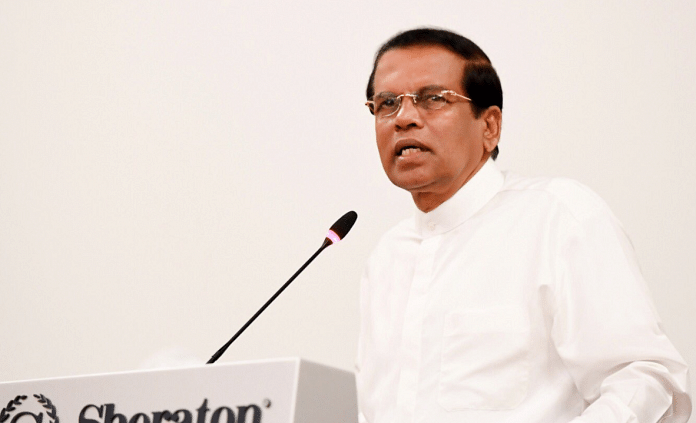The acrimonious campaign for the local government elections indicates the end of the road for the government of ‘National Unity’ in Sri Lanka.
Going by the high-voltage, competing campaign for Saturday’s (10 February) local government elections, and the intervening parliamentary debate on corruption, it seems to be the end of the road for the constitutionally-facilitated ‘Government of National Unity’ in Sri Lanka.
Even without the ‘unfriendly contests’ between President Maithripala Sirisena’s Sri Lanka Freedom Party (SLFP) and Prime Minister Ranil Wickremesinghe-led United National Party (UNP) majority-partner, the government can be rocked from outside by the SLPP-JO centred on former President Mahinda Rajapaksa.
The ‘unity government’ came to power in January 2015 with the avowed promise of ‘governance reforms’ but with the single-point agenda of removing war-time President Rajapaksa. In the parliamentary polls that year, the SLFP and the UNP clashed, but the chief campaigner of the SLFP — former President Rajapaksa — could not get the adequate numbers to stake claim to form a government. The UNP under Wickremesinghe had the numbers on its side with support from poll-time allies, and they continued in office.
By now, things should have settled down and the partners in government should have coalesced well, but they have still not stopped quarrelling. So much so, ahead of Saturday’s local government polls, Sirisena has openly declared that he could not continue to run a government with ‘corrupt’ people, a reference to the UNP ally. Hitting back without losing time, Wickremesinghe said that those criticising the UNP on this score were ‘shielding the corrupt’ within their own parties.
The acrimonious local government poll campaign — which the Sirisena-Wickremesinghe duo stalled for over two years by inventing reasons that did not wash — indicate that the two can part company. But here is a twist. After the 19th constitutional amendment that the duo had got parliament to pass, the President cannot dismiss the elected government/Parliament at the end of the first year, as empowered earlier. Instead, he could do so only six months ahead of the next parliamentary polls and without assigning reasons.
The long run-up to the next round of presidential and parliamentary polls in 2020 is bound to be fraught with more political instability.
Sirisena’s presidential fate would be decided before his powers to sack Parliament becomes operational. The alternative would be for him to try cobble together a new coalition — something that Wickremesinghe could also try. All these manoeuvrings could also mean even less of governance, leave aside the promised ‘good governance’. Either way, the ideologically-different political parties that the two head, the inherent secretive nature of Wickremesinghe, coupled with the even more secretive personality of Sirisena, was sure recipe for disaster from the start.
Watching it all from the sidelines, and with more popular support than his rivals are ready to concede, is Rajapaksa himself. From within the SLFP-led combine in the ruling coalition, he continues to head a very identifiable ‘ginger group’, calling itself the Joint Opposition (JO).
However, the government itself has a two-thirds majority in Parliament, thanks to Wickremesinghe’s UNP allies, and also the ‘outside’ sympathy, if not support, of the Tamil National Alliance (TNA), with 17 MPs. TNA’s R Sampanthan, (and not JO’s Dinesh Gunawardene), is also the officially-recognised leader of the opposition in Parliament. Gunawardene has 50-odd MPs with him, including Rajapaksa, but UNP-elected Speaker Karu Jayasuriya has refused to recognise them.
There are not many from within Sri Lanka today who could play a mediatory role to sort out differences within the government. The sympathies of the majority Sinhala-Buddhist community’s high-priests are not anyway with the government leaders after they talked about a new Constitution (supposedly under way, still) where ‘compromises’ were being sought to be made to the nation’s ‘unitary’ character and Buddhism’s pride of place.
The current drift is thus difficult to stop. Focusing on a Central Bank bonds scam, Sirisena has been taking pot-shots at Wickremesinghe’s UNP. He even got finance minister Ravi Karunanayake removed, and later sacked. The report of the probe that he ordered, along with those that he had ordered against predecessor Rajapaksa regime for financial irregularities are being debated in Parliament ahead of the local government polls.
For either the President or the Prime Minister to corner each other or jointly corner Rajapaksa, they need to pass new laws in Parliament, and provide time for them to become operational and produce desired (political) results. Neither Wickremesinghe nor Sirisena has the time, patience or the unity required to take on Rajapaksa anymore — but are all set to implode, instead, and early on.
The cup of woes is overflowing for Sri Lankans, who are faced with massive price rise and inflation, unemployment, campus and labour unrest, and fertilizer shortage for the farming industry. The Tamils too are feeling ‘cheated’ on the issue of a new Constitution, power-devolution and war-crime probes.
Under such circumstances, when the government of the day is talking about disenfranchising Rajapaksa instead for ‘corruption’, the nation has to be watchful against youth frustration taking a militant turn. This has happened before in the case of the Sinhala JVP in the south and the Tamil Tigers in the north and the east.
The writer is Director, Chennai Chapter of the Observer Research Foundation.



